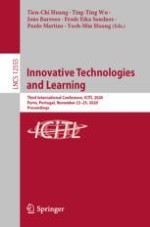2020 | OriginalPaper | Buchkapitel
Integration of LUPDA Theory and STEAM with Computational Thinking Concepts to Develop Assessment Principles for an AI Based STEAM Activity
verfasst von : Chih-Hung Wu, Yueh-Min Huang
Erschienen in: Innovative Technologies and Learning
Aktivieren Sie unsere intelligente Suche, um passende Fachinhalte oder Patente zu finden.
Wählen Sie Textabschnitte aus um mit Künstlicher Intelligenz passenden Patente zu finden. powered by
Markieren Sie Textabschnitte, um KI-gestützt weitere passende Inhalte zu finden. powered by
